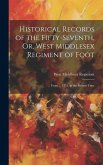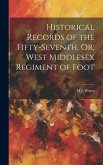The 'Die-Hards' is the nickname of the Middlesex Regiment, earned at the battle of Albuera in the Peninsular War in May 1811. The Regiment was one of five that had four regular battalions before the outbreak of war, it also had two Special Reserve battalions (5th and 6th) and four Territorial battalions, 7th to 10th. During the course of the war another thirty-nine battalions were formed making the Regiment the second largest along with the King's (Liverpool), though not all battalions survived to the end of the war; twenty-four of them went abroad, serving on the Western Front, Gallipoli, Italy, Macedonia, Mesopotamia, India, Egypt, Palestine, Gibraltar and Siberia. Losses amounted to 12,720, 81 Battle Honours and 5 VCs were awarded. The Middlesex were in it right from the start, the first soldier of the BEF to be killed was L/Cpl Parr, 4th Middlesex, on 21 August 1914, and the first officer to be killed was from the same battalion - Major W.H Abell, at Mons on 23 August. This is not a history that deals with each battalion independently, there are too many of them. The narrative describes the fortunes of the twenty-four active service battalions (with very good maps) in the various theatres of war, though mainly on the Western Front, and on every page there is, in the margin the date of the action or event being described and the battalion or battalions involved. The first volume covers 1914 to the end of 1916, and the second takes up the story from the beginning of 1917 to the armistice, including a chapter on operations in Siberia and Murmansk involving the 25th Battalion which didn't get home till September 1919. Speaking of his battalion [25th] the CO said: "One and all behaved like Englishmen - the highest eulogy that can be passed upon the conduct of men." Sentiments like that expressed today would almost get you clapped in irons! There is no Roll of Honour nor list of Honours and Awards. There is a very useful appendix listing all the active service battalions with the brigades and divisions to which they were allocated with any subsequent changes, and the theatres in which they served.
Bitte wählen Sie Ihr Anliegen aus.
Rechnungen
Retourenschein anfordern
Bestellstatus
Storno








